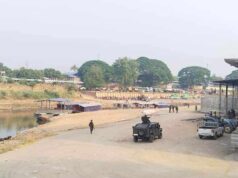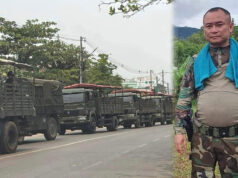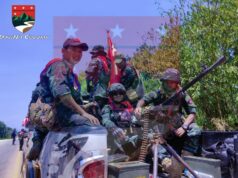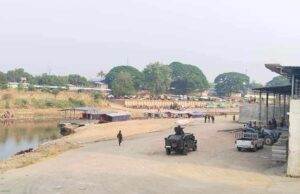29 April
Feature
Written by KIC Reporters
Karen refugees persuaded to return to Burma by Thai authorities in February 2010 are now struggling to cope. When the 4,500 Karen villagers crossed to safety in Thailand in May and June 2009, to escape being used as forced labor and a military offensive in northeastern Karen state by the Burmese army and their militia allies, the Democratic Karen Buddhist Army they lost everything.
Villagers lost their farming and building tools, seed stock, animals, houses, plantations, blankets, cooking pots and even their clothes.
To add to their difficulties their farmland and walkways had been mined and the area is still been fought over by warring Karen armies.
Speaking at the time of repatriation of the refugees, the international humanitarian group, Human Rights Watch, said there were serious concerns about the returning villagers’ safety.
“Human Rights Watch has grave fears for the safety of civilians forcibly returned to active conflict zones inside Burma. All three parties to the conflict in Karen state extensively use antipersonnel mines and improvised explosive devices (IEDs).”
The more than 1,000 villagers who returned to Pa-an district say they have problems farming without their animals or tools.
Today (Thursday), a farmer from Mae La Ah Khee, spoke by phone to the Karen Information Centre and said.
“I have no ox, no buffaloes. I can’t prepare or plough my land for planting. Before we left for Thailand, we hid our plough machines in the mountains, now we all have to share them, four machines, between more than 300 people.”
The farmer said those refugees working on hill farms had returned to Burma too late to prepare their lands for planting their crops.
“It’s [also] dangerous. People are really panicking about landmines and unexploded bombs. They’re too scared to go to their farms and afraid to travel far from the village.”
The Karen Human Rights Groups say on their website that since the refugees were returned to Burma “… a seven-year-old child from a family that was forced to depart the Mae U Su camp…was killed and his ten-year-old brother severely injured by an unexploded M79 round found outside their village.”
Repatriated villagers say the three months rations they were given to help them resettle have finished. Saw Lay Taw, the Karen National Union, secretary for Pa-an district said villagers do not have enough food to feed their families.
“Villagers are telling us they do not have any food left. They are now caught between crop cycles, too late to prepare their land, it’s not the growing season and landmines make it dangerous to farm.”
Before repatriation villagers voiced their dissatisfaction to the relevant authorities at being sent back to the conflict zone. Villagers told human rights groups it was not that they didn’t want to return, but the timing was wrong. Saw Yo Moo, from Mae La Ah Hta village, told KIC that they were under pressure from Thai authorities to agree to being sent back and they were unhappy.
“We were under constant pressure from the Thai army to go back. The army warned us not say we were under pressure to return.”
Human Rights Watch said at the time that villagers were under a great deal of pressure from local authorities to return to Burma. “Local Thai military officials claim there is no fighting across the border in Burma and assert that it is safe for the Karen to return. However, refugees at one of the sites told Human Rights Watch there has been extensive planting of landmines in their villages back in Burma, and they fear being used as forced porters by the Burmese army and the DKBA.”
In response to claims by human rights groups, Colonel Noppadol Watcharajitbaworn, a Thai military commander was reported to have said in British newspaper, The Independent.
“There is no forced repatriation as it’s not our policy,” he said. “The commander of Thailand’s Third Army has given assurances that these refugees are volunteering. We will not force them back if they don’t volunteer to go.”
It is estimated by community-based-organizations that the more than 2,000 refugees who stayed behind in Thailand have been absorb into the local area, but they are at risk from unscrupulous people who may seek to take advantage of their illegal status.
In a telephone interview with KIC, the farmer from Mae La Ah Khee, said villagers knew if they went back they would face problems as the rations were not enough to see them through to the next harvest.
“We had no choice, we were under pressure to go back. We knew at the time that three months rations would not last.”
The farmer said those who had something to sell might be able to tough it out.
“Those who have possessions like livestock, gold necklaces, rings, bracelets can sell them for money to buy food.”
Saw Lay Taw, KNU, Pa-an district secretary, said villagers who did not have possessions to sell, had no option, but to risk landmines and army patrols to forage and hunt for food in the jungle.
The future for the repatriated refugees is bleak. They are now refugees in their own country and join the ever growing estimated 500,000 displaced people in eastern Burma.
#ENDS#

















